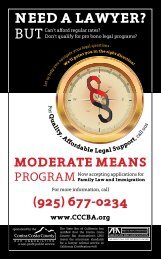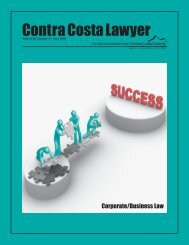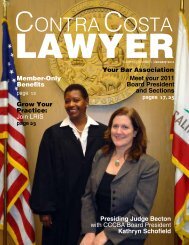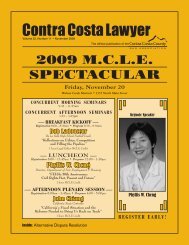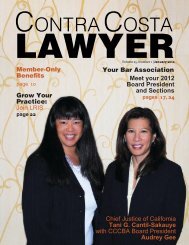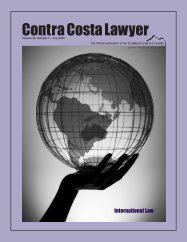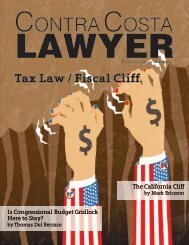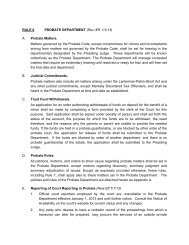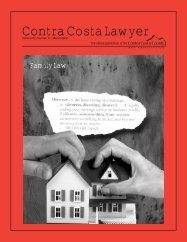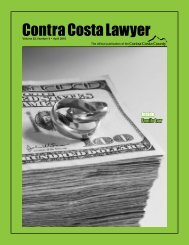download - Contra Costa County Bar Association
download - Contra Costa County Bar Association
download - Contra Costa County Bar Association
- No tags were found...
You also want an ePaper? Increase the reach of your titles
YUMPU automatically turns print PDFs into web optimized ePapers that Google loves.
A GOODREVIEWbut only if the statements made in the review were false.Even then, it’s probably not a good idea. The AssociatedPress recently reported about a Minneapolis Neurologist,David McKee, who sued a patient’s son for defamationafter he wrote a scathing review, including disparagingcomments allegedly said by the doctor to him andhis family following his father’s stroke. McKee claimsthat the statements attributed to him were not true. Thisparticular case has not been decided, but such suits arerarely successful. A study by Eric Goldman, a professorat Santa Clara University School of Law, revealed that ofthe 28 physicians who have recently filed similar suits,16 of them were dismissed and six of them settled.The outcome of such suits can be devastating. In aJuly 13, 2009, article the San Francisco Chronicle reportedabout a California dentist, Yvonne Wong, who sued apatient and Yelp after the patient posted a negative reviewon Yelp’s site. Ultimately, Ms. Wong was orderedto pay more than $80,000 in attorney’s fees to her patientand Yelp. The judge ruled in that case that California’sstringent anti-SLAPP law could be appliedbecause the patient had mentioned mercury fillingsin her review, and thus the review furthered discussionof an issue of public interest.Even Yelp’s spokeswoman Kristen Whisenandrecommends against using the “nuclear option”and suing for a negative review. Why? Because itusually only brings more attention to the negativereview—which is what the professionaldidn’t want in the first place. For example, in2007, the New York Times reported about attorneyJohn Henry Browne who sued the lawyerrankingsite Avvo alleging that his 5.7 (out of10) ranking was damaging to his law practice.A federal judge held that the reviewswere protected under the First Amendmentright to express opinions and dismissed thecase. The case brought more public noticeto the negative Avvo reviews that the attorneywanted removed in the first place.A search of the same attorney now showsthat he was able to raise that number to6.6, so maybe he learned a thing or twosince then. Or maybe he simply becamemore Internet-savvy and learned howto work the system.The best option for attorneys is tocheck the ratings websites, and respondto the reviews in a friendly, proactivemanner. For example, one SanFrancisco attorney with a rating of 2.5 stars on Yelp (outof 5 possible stars) responded to each and every one ofhis negative reviews in a polite manner that did not divulgeprivileged information. Although measures suchas these may seem distasteful, the reality is that socialmedia exists, people do check it when searching for anattorney, and the only thing attorneys can do is to stayon top of things. sCarol M. Langford has a practice in State <strong>Bar</strong> defenseand professional licensing disputes in Walnut Creek.She teaches professional responsibility as an adjunctat U.C. Berkeley, Boalt Hall School of Law and HastingsCollege of the Law. Additionally, Ms. Langford serves asan expert witness in cases involving complicated ethicsissues and presents at conferences and symposiumsacross the state. She is a past Chair of the CaliforniaCommittee on Professional Responsibility and Conduct.CONTRA COSTA COUNTY BAR ASSOCIATION CONTRA COSTA LAWYER 31



